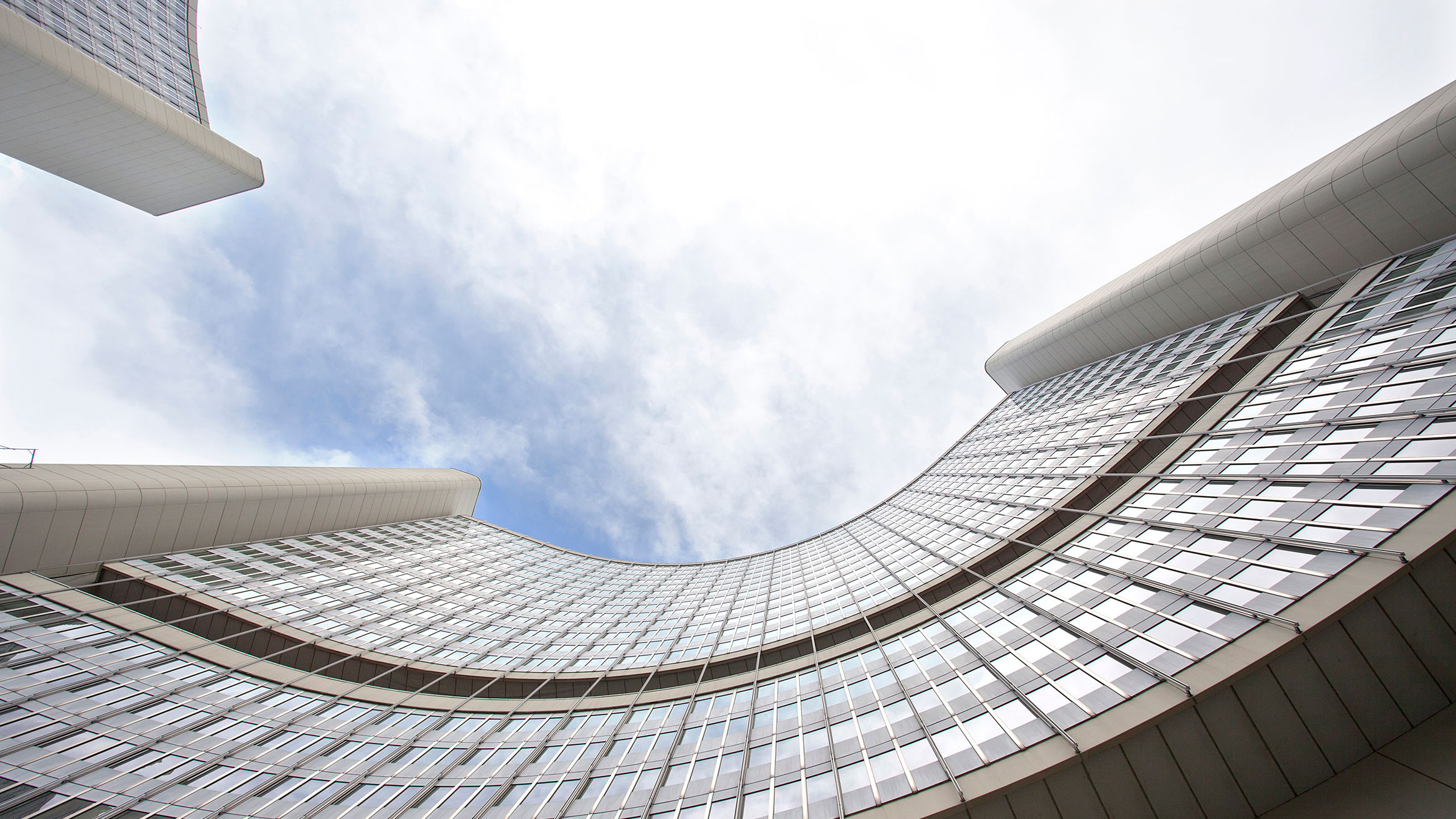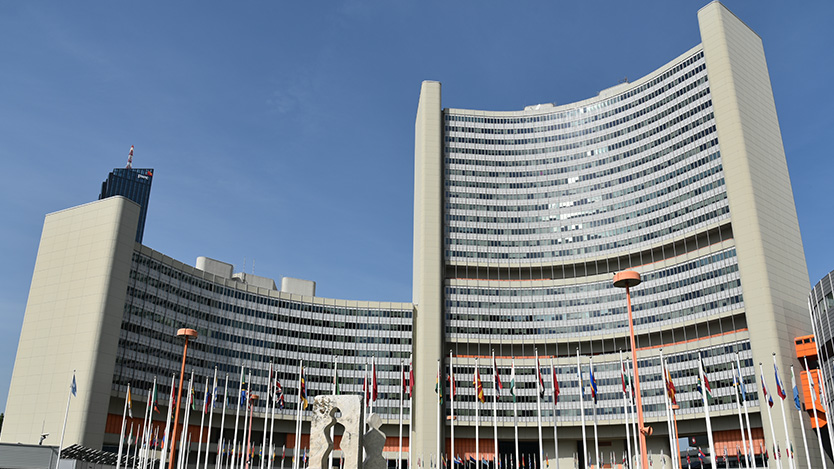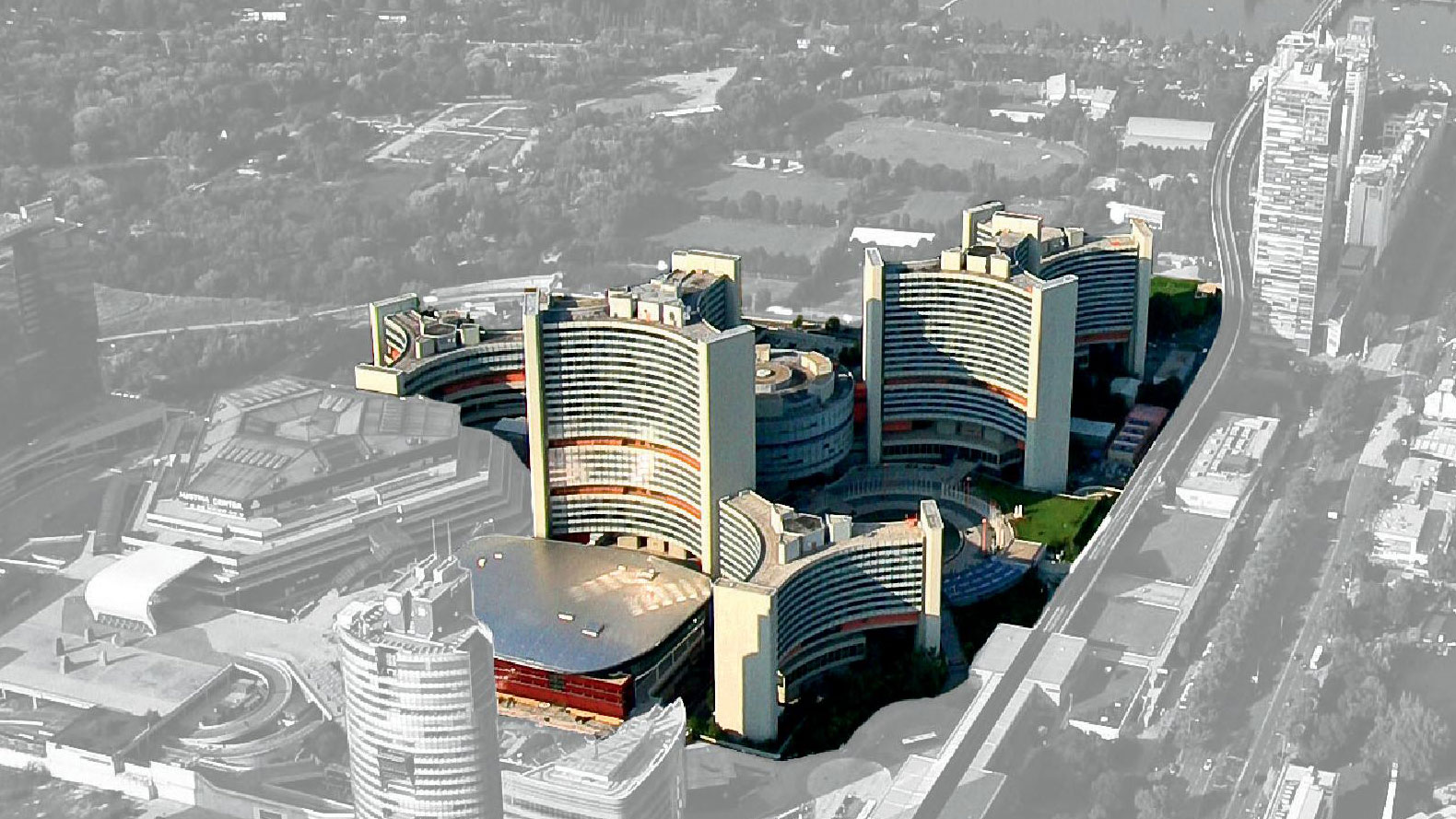The United Nations Office at Vienna (UNOV): provides administrative support including conference planning, security and language interpretation to UN programmes. The Director-General of UNOV represents the Secretary-General in dealings with the host country and diplomatic missions in Vienna.
The International Atomic Energy Agency (IAEA): is the world's central intergovernmental forum for scientific and technical co-operation in the nuclear field. It works for the safe, secure and peaceful uses of nuclear science and technology, contributing to international peace and security and the United Nations' Sustainable Development Goals.
The United Nations Industrial Development Organization (UNIDO): is the specialized agency that promotes industrial development to create shared prosperity and advance economic competitiveness while safeguarding the environment and strengthening knowledge and institutions.
The United Nations Office on Drugs and Crime (UNODC): from its headquarters in Vienna and through a global network of field offices, UNODC assists Member States to address the threat posed by drugs, crime, corruption and terrorism and to promote security and justice for all.
The Preparatory Commission for the Comprehensive Nuclear-Test-Ban Treaty Organization (CTBTO PrepCom): is preparing for the implementation of the Comprehensive Nuclear-Test-Ban Treaty (CTBT), which bans nuclear explosions by everyone, everywhere: on the Earth's surface, in the atmosphere, underwater and underground. It is establishing a global verification regime with 337 monitoring facilities to ensure no nuclear explosion goes undetected. The monitoring data are also used for non-verification purposes such as tsunami warnings and global radiation monitoring.
The United Nations Office for Outer Space Affairs (UNOOSA): promotes international cooperation in the peaceful use of outer space. It helps Member States, in particular developing countries, gain access to space science, technology and applications for sustainable development. Through UN-SPIDER, UNOOSA helps all countries leverage the potential of space technologies for disaster management and emergency response. UNOOSA also implements the Secretary-General's responsibilities under international space law and maintains the UN Register of Objects Launched into Outer Space.
The Independent International Commission of Inquiry on Ukraine (IICIU): was established by the UN Human Rights Council to investigate violations and abuses of human rights, violations of international humanitarian law, and other crimes that may have been committed in the context of the aggression by the Russian Federation against Ukraine. It is led by three independent experts Erik Møse of Norway (Chair) and two other Commissioners Vrinda Grover of India and Pablo de Greiff of Colombia.
The International Commission for the Protection of the Danube River (ICPDR): promotes international cooperation to make the Danube, Europe's second largest river, cleaner, healthier and safer while working towards ensuring the sustainable and equitable use of waters and freshwater resources in the Danube River Basin. The work of ICPDR is based on the Danube River Protection Convention.
The International Narcotics Control Board (INCB): is an independent panel of experts monitoring and promoting the implementation of the UN drug control conventions. INCB works to ensure the availability of narcotic drugs and psychotropic substances for medical and scientific purposes while preventing diversion into illicit channels. The Board monitors national controls over precursor chemicals used in the illicit manufacturing of drugs and assists Governments in preventing the diversion of precursors.
The International Organization for Migration (IOM): is dedicated to promoting humane and orderly migration for the benefit of all and international cooperation on migration issues. It also provides humanitarian assistance to migrants in need. IOM Vienna consists of the IOM Country Office for Austria and the Regional Office for South-Eastern Europe, Eastern Europe and Central Asia.
Secretariat of the Carpathian Convention - UN Environment Vienna: promotes international cooperation for the protection and sustainable development of the Carpathians, Europe's largest transboundary mountain region, based on the Carpathian Convention. The office is UN Environment's global hub for work on mountains and the sub-regional hub for UN Environment in South-East Europe.
Sustainable Energy for All Initiative (SEforALL): is a global platform working to achieve universal access to sustainable energy, as a contribution to a cleaner, just and prosperous world for all. The initiative brings together thousands of partners from the public sector, private sector and civil society.
The United Nations Commission on International Trade Law (UNCITRAL): is focussed on the modernization and harmonization of laws for international trade and business to reduce legal obstacles to the international flow of goods. UNCITRAL develops conventions, model laws and rules as well as legal and legislative guides in areas such as arbitration and mediation; micro-, small- and medium-sized enterprises; electronic commerce; insolvency law and security interests.
The United Nations Department of Political and Peacebuilding Affairs (DPPA): maintains a Liaison Office in Vienna, which also represents the UN Departments of Peace Operations, and Operational Support. It aims to strengthen the cooperation between the represented departments and the Organization for Security and Co-operation in Europe (OSCE).
The United Nations High Commissioner for Refugees (UNHCR): monitors the implementation of the relevant asylum laws in Austria according to the Geneva Refugee Convention and makes suggestions on refugee related questions to the authorities.
The United Nations Information Service (UNIS) Vienna: as part of the network of UN Information Centres around the world, UNIS communicates the activities and concerns of the United Nations to the four countries it serves - Austria, Hungary, Slovakia and Slovenia. It also supports the public information activities of Vienna-based UN organizations.
The United Nations Office for Disarmament Affairs (UNODA) Vienna Office: facilitates closer cooperation and effective interaction in all areas of disarmament, non-proliferation and arms control. The Vienna Office coordinates the Disarmament and Non-Proliferation (DNP) Education Partnership, bringing together 30 partner organizations to develop educational packages on disarmament topics.
The United Nations Office for Project Services (UNOPS) Austria Multi-Country Office represents UNOPS in Austria and serves as a management centre to efficiently deliver its mandate in 12 countries in Central Asia, Western Balkans, South Caucasus, and Türkiye. Contributing to the 2030 Agenda for sustainable development, UNOPS provides infrastructure, procurement and project management solutions to partners. UNOPS’ presence in Vienna also includes the Water Environment and Climate Portfolio that manages global initiatives on climate, transboundary water management, biodiversity and the environment.
The United Nations Postal Administration (UNPA): issues United Nations stamps which reflect the work of the organization. The stamps issued in Vienna are valid for postage on mail sent from the United Nations in Vienna.
The United Nations Register of Damage Caused by the Construction of the Wall in the Occupied Palestinian Territory (UNRoD): keeps documentary record of the damage resulting from the construction of the Wall by Israel in the Occupied Palestinian Territory, including in and around East Jerusalem.
The United Nations Scientific Committee on the Effects of Atomic Radiation (UNSCEAR): evaluates the levels and effects of exposure to ionizing radiation. Its reports provide the scientific basis for radiation protection measures used by governments and international bodies.



Organized by Uniport, the Career Service of the University of Vienna, and the WU ZBP Career Center of the University of Economics in Vienna, the “Long Night of Companies” offered students and recent graduates a unique chance to visit different companies and institutions to learn about what they do and potential career paths. Out of more than 22 shuttle lines, bus line 21 brought some of the participants straight to the United Nations in Vienna.
Avraham Roet was born in Amsterdam in 1928 and spent a normal childhood in the Netherlands. Everything changed in 1940 when the Nazis invaded and began persecuting Jews throughout the country. Avraham managed to escape and was hidden by Catholic farmers. In this short documentary, he recounts his life and the fate of his family members who were murdered in Auschwitz.
In September 2024, the United Nations General Assembly adopted the Pact for the Future to reform the international order. Improving international peace and security is one of the key areas addressed in the Pact. Austria's Permanent Representative to the United Nations in New York, Ambassador Alexander Marschik talks about the negotiations on Security Council reform and the Pact.
The UN Shadowing Programme, which starts each year on United Nations Day (celebrated on 24 October) and runs for one month, offers Master’s and PhD students the opportunity to have an online session with a United Nations staff member and attend a virtual UN careers workshop.